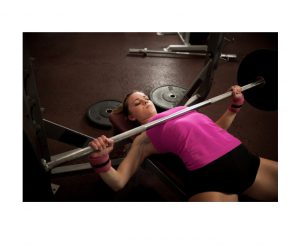Written by: Adam Whitlach, Head Trainer
Western Reserve Racquet and Fitness Club
I have had the pleasure of working with a handful of athletes over the years. During this time, it has been exciting to watch these kids grow and improve. Working with tennis athletes primarily presents its' own set of unique challenges. Tennis is not typically considered a hardcore sport like football or wrestling. With that comes a stigma that tennis requires light weights, unstable platforms, lots of exercises with bands, and agility drills. So it's always interesting to see the parents' reactions of intrigue and skepticism when they see their kids lifting heavy weights.
Get stronger in order to get faster
One day I was reading an article about weightlifting that got me thinking about the success of these athletes and the different stereotypes associated with individual sport environments. One of my first athletes was a 13 year old female tennis player, about 5'10" weighing 125 lbs who wanted to get faster for tennis and was also about to dabble in track. Our objectives were quite simple; she needed to get stronger in order to get faster.
Speed requires muscles to contract with tremendous force, and in an instant, to propel the athlete in the desired direction. Thus, weak athletes are slow athletes. I began by teaching her basic power movements; squat variations, different versions of presses, and deadlifting. This slender, quiet girl ended up deadlifting over 225 lbs and placing 8th at States in the Long Jump as a freshman! Athletes don't get results like this without learning how to train. They train...they don't exercise. They eat...they don't diet.
"Going through the motions" won't cultivate progression. Training should be hard. It's not the time to update your Instagram.
A training program should not be determined by the sport they play
With results like hers, it becomes easier to explain to parents why athletes train in a similar way regardless of sport. Training athletes to improve using basic movements should not be determined by the sport they play. While volume and intensity should be adjusted depending on the sport, there is not reason tennis players shouldn't squat or lacrosse players shouldn't deadlift. I've had 70+ year old women pushing sleds. Do you honestly think sleds are only good for football practice? Of course not! Making people stronger is going to contain very similar characteristics, regardless of the goal!
It can be difficult to determine if the athlete's shortcomings are a result of problems in the weight room or lack of skill on the field. In that case, the trainer and the coach should have a dialogue about the athlete in question. I'm not going to pretend to be a tennis coach nor should a tennis coach pretend to be a trainer. Often when a coach sees a deficiency on the court, they automatically have the athlete perform agility drills to get faster. 9 times out of 10 we are just dealing with a slow athlete that needs a solid strength program.

